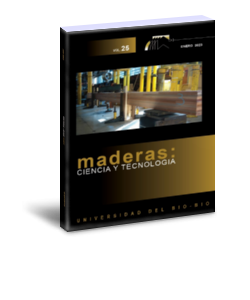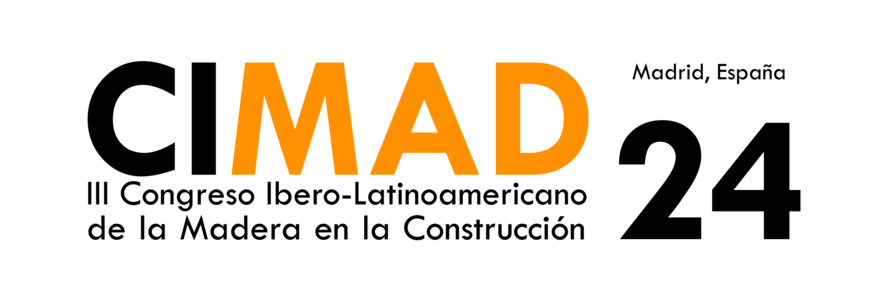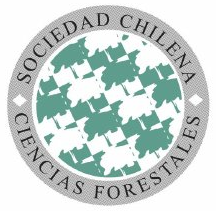Effect of chip temperature during bonding on particleboard properties
DOI:
https://doi.org/10.4067/s0718-221x2023000100417Keywords:
Chip temperature, mechanical properties, particleboard, urea formaldehyde resin, wood-based panelsAbstract
In the production of particleboard, the chips emerging from the drying oven usually pass into the bonding process without sufficiently cooling down. Moreover, along with the effect of friction during the bonding process, the increased chip temperature boosts the consumption of resin/adhesive and affects the properties of the board. This study investigated the effect of chip temperature during the bonding process on the properties of particleboard. With this aim, the effects were determined for six different temperatures (25 °C, 30 °C, 35 °C, 40 °C, 50 °C, 55 °C) measured during the bonding of the chips. According to the results, optimum board properties were obtained from the groups in which the chip temperature measured during the bonding process was 30 °C – 40 °C. Furthermore, it was determined that chip temperatures of above 40 °C during the bonding process significantly reduced the mechanical properties.
Downloads
References
Akbulut, T. 1995. The Effects of various factors on properties of flat-pressed particle boards. Doctoral dissertation, Istanbul University Institute of Science and Technology, İstanbul, Turkey. (Turkish, Abstract in English). https://tez.yok.gov.tr/UlusalTezMerkezi/giris.jsp
Antov, P.; Savov, V.; Neykov, N. 2020. Sustainable bio-based adhesives for eco-friendly wood composites. A review. Wood Res 65(1): 51-62. https://doi.org/10.37763/wr.1336-4561/65.1.051062
Atta-Obeng, E.; Via, B.K.; Fasina, O. 2012. Effect of microcrystalline cellulose, species, and particle size on mechanical and physical properties of particleboard. Wood Fiber Sci 44(2): 227-235. https://wfs.swst.org/index.php/wfs/article/view/1760
Aydın, İ. 2004. Kaplama kurutma işleminde yüzey inaktivasyonu ve yapışma direncine etkileri. (In Turkish). Acu J For Fac 1-2: 1-8. http://ofd.artvin.edu.tr/download/article-file/25620
Aydın, U. 2016. The effect of chip geometry and change of draft humid on the feature of particle board. Msc. Theses, Bartın University, Graduate School of Applied and Naturel Sciences, Bartın, Turkey. (Turkish, Abstract in English). https://tez.yok.gov.tr/UlusalTezMerkezi/giris.jsp
Barbu, M.C.; Steinwender, M. 2009. The State of The Art For The Environmental Protection In The European Wood Bases Panels Industry. Pro Ligno 5(2): 85-95. https://www.proligno.ro/en/articles/2009/2/paper9.htm
Cai, Z.; Wu, Q.; Lee, J.N.; Hiziroglu, S. 2004. Influence of board density, mat construction, and chip type on performance of particleboard made from eastern red cedar. Forest Prod J 54(12): 226-232. https://www.fs.usda.gov/treesearch/pubs/21932
Cheng, X.; He, X.; Xie, J.; Quan, P.; Xu, K.; Li, X.; Cai, Z. 2016. Effect of the particle geometry and adhesive mass percentage on the physical and mechanical properties of particleboard made from peanut hull. BioResources 11(3): 7271-7281. https://ojs.cnr.ncsu.edu/index.php/BioRes/article/view/BioRes_11_3_7271_Cheng_Particle_Geometry_Adhesive_Mass_Percentage
FAOSTAT 2022. https://www.fao.org/faostat/en/#data/FO
Frybort S.; Mauritz R.; Teischinger, A.; Muller, U. 2008. Cement bonded composites – A mechanical review. BioResources 3(2): 602–626.
https://ojs.cnr.ncsu.edu/index.php/BioRes/article/view/BioRes_03_2_0602_CementBondedComposites
Hassan E.B.; Kim M.; Wan H. 2009. Phenol–formaldehydetype resins made from phenol-liquefied wood for the bonding of particleboard. J Appl Polym Sci 112 (3): 1436-1443. https://doi.org/10.1002/app.29521
İstek A.; Sıradag, H. 2013. The effect of density on particleboard properties. In Proceedings of the “International Caucasian Forestry Symposium”, 23-26 October, Artvin, Turkey, 932-938. https://www.semanticscholar.org/paper/THE-EFFECT-OF-DENSITY-ON-PARTICLEBOARD-PROPERTIES-Istek Sirada%C4%9F/271d53a520ee7f5f39d33fe9bf78be1bfc884be7?p2df
İstek, A.; Aydemir, D.; Aksu, S. 2010. The effect of décor paper and resin type on the physical, mechanical, and surface quality properties of particleboards coated with impregnated décor papers. BioResources 5(2): 1074-1083. https://ojs.cnr.ncsu.edu/index.php/BioRes/article/view/BioRes_05_2_1074_Istek_AA_Decor_Paper_resins
İstek, A.; Aydemir, D.; Eroğlu, H. 2013. Combustion properties of medium-density fiberboards coated by a mixture of calcite and various fire retardants. Turk J Agric For 37(5): 642-648. https://journals.tubitak.gov.tr/agriculture/issues/tar-20-44-5/tar-44-5-10-1905-87.pdf
İstek, A.; Aydin, U.; Ozlusoylu, I. 2019. The effect of mat layers moisture content on some properties of particleboard. Drv İnd 70(3): 221-228. https://doi.org/10.5552/drvind.2019.1821
İstek, A.; Özlüsoylu, İ.; Kızılkaya, A. 2017. Turkish wood based panels sector analysis. Barofd 19(1): 132-138. https://dergipark.org.tr/tr/pub/barofd/issue/27137/297231
Kakaras, I.A.; Papadopoulos, A.N. 2004. The effects of drying temperature of wood chips upon the internal bond strength of particleboard. J Inst Wood Sci 16(5): 277-279. http://users.teilar.gr/~kakaras/JIWS-effects-drying-on-IB.pdf
Kalaycıoğlu, H.; Özen, R. 2009. Yonga Levha Endüstrisi Ders Notları [Particleboard Industry Lecture Notes]. Karadeniz Technical University, Faculty of Forestry, Forest Industry Engineering Department, Trabzon, Turkey. (In Turkish)
Kehr, E. 1966. On the improvements of particleboard surfaces. Holz Roh-Werkst 24(7): 295-305. https://doi.org/10.1007/BF02605294
Kehr, E.; Jensen U. 1969. On thickness variations of calibrated particleboards. Holztechnologie 10(2): 97-104.
Lias, H.; Kasim, J.; Johari, N.A.N.; Mokhtar, I.L.M. 2014. Influence of board density and particle sizes on the homogenous particleboard properties from kelempayan (Neolamarckia cadamba). IJLRST 3(6): 173-176. https://www.mnkjournals.com/journal/ijlrst/pdf/Volume_3_6_2014/10443.pdf
Mantanis, G.I.; Athanassiadou, E.T.; Barbu, M.C.; Wijnendaele, K. 2018. Adhesive systems used in the European particleboard, MDF and OSB industries. Wood Mater Sci & Eng 13(2): 104-116. https://doi.org/10.1080/17480272.2017.1396622
Nemli G.; Demirel S. 2007. Relationship between the density profile and the technological properties of the particleboard composite. J Compos Mater 41(15): 1793-1802. https://doi.org/10.1177/0021998307069892
Nemli, G.; Demirel, S.; Zekoviç, E. 2006. Yonga rutubeti, parafin kullanımı ve ağaç cinsinin yongalevhanın bazı teknolojik özellikleri üzerine etkileri. Acu J For Fac 7(2): 81-93. (In Turkish) http://ofd.artvin.edu.tr/en/download/article-file/25675
Onuorah, E.O. 2001. The effects of some manufacturing variables on the properties of particleboard. Niger. J Technol 20(1): 19-40. https://www.ajol.info/index.php/njt/article/view/123301
Papadopoulos, A.N. 2020. Advances in wood composites II. Polymers 12(7): 1552. https://doi.org/10.3390/polym12071552
Pędzik, M.; Janiszewska, D.; Rogoziński, T. 2021. Alternative lignocellulosic raw materials in particleboard production: A review. Ind Crops Prod 174: 114162. https://doi.org/10.1016/j.indcrop.2021.114162
Sanabria, S.J.; Hilbers, U.; Neuenschwander, J.; Niemz, P.; Sennhauser, U.; Thömen, H.; Wenker, J.L. 2013. Modeling and prediction of density distribution and microstructure in particleboards from acoustic properties by correlation of non-contact high-resolution pulsed air-coupled ultrasound and X-ray images. Ultrasonics 53(1): 157-170. https://doi.org/10.1016/j.ultras.2012.05.004
Sarı, B.; Nemli, G.; Ayrilmis, N.; Baharoğlu, M.; Bardak, S. 2013. The influences of drying temperature of wood particles on the quality properties of particleboard composite. Drying Technol 31(1): 17-23. https://doi.org/10.1080/07373937.2012.711791
Turkish Standardization Institute. 1997. Standard atmospheres for conditioning and/or testing; Specifications. TS 642 – ISO 554. TSE. Ankara, Turkey. https://intweb.tse.org.tr/Standard/Standard/StandardAra.aspx
Turkish Standardization Institute. 1999. Wood- Based Panels-Determination of modulus of elasticity in bending and of bending strength. TS EN 310. TSE. Ankara, Turkey. https://intweb.tse.org.tr/Standard/Standard/StandardAra.aspx
Turkish Standardization Institute. 2005. Wood-based panels - Surface soundness - Test method. TS EN 311. TSE. Ankara, Turkey. https://intweb.tse.org.tr/Standard/Standard/StandardAra.aspx
Turkish Standardization Institute. 2012. Particleboards – Specification. TS EN 312. TSE. Ankara, Turkey. https://intweb.tse.org.tr/Standard/Standard/StandardAra.aspx
Turkish Standardization Institute. 1999. Particleboards and fibreboards- Determination of swelling in thickness after immersion in water. TSE. TS EN 317. Ankara, Turkey. https://intweb.tse.org.tr/Standard/Standard/StandardAra.aspx
Turkish Standardization Institute. 1999. Particleboards and fibreboards- Determination of tensile strength perpendicular to the plane of the board. TS EN 319: TSE. Ankara, Turkey. https://intweb.tse.org.tr/Standard/Standard/StandardAra.aspx
Turkish Standardization Institute. 2011. Fiberboards, determination of resistance to axial withdrawal of screws. TS EN 320. TSE. Ankara, Turkey. https://intweb.tse.org.tr/Standard/Standard/StandardAra.aspx
Turkish Standardization Institute. 1999. Wood-based panels- Determination of moisture content. TS EN 322. TSE. Ankara, Turkey. https://intweb.tse.org.tr/Standard/Standard/StandardAra.aspx
Turkish Standardization Institute. 1999. Wood- Based panels- Determination of density. TS EN 323. TSE. Ankara, Turkey. https://intweb.tse.org.tr/Standard/Standard/StandardAra.aspx
Turkish Standardization Institute. 1999. Wood- Based panels- Sampling, cutting and inspection- Part 1: Sampling test pieces and expression of test results. TSE. TS EN 326-1. Ankara, Turkey. https://intweb.tse.org.tr/Standard/Standard/StandardAra.aspx
Wong, E.D.; Zhang, M.; Wang, Q.; Kawai, S. 1998. Effects of mat moisture content and press closing speed on the formation of density profile and properties of particleboard. J Wood Sci 44(4): 287-295. https://doi.org/10.1007/BF00581309
Downloads
Published
How to Cite
Issue
Section
License

This work is licensed under a Creative Commons Attribution 4.0 International License.
Los autores/as conservarán sus derechos de autor y garantizarán a la revista el derecho de primera publicación de su obra, el cuál estará simultáneamente sujeto a la Licencia de Reconocimiento de Creative Commons CC-BY que permite a terceros compartir la obra siempre que se indique su autor y su primera publicación esta revista.




































